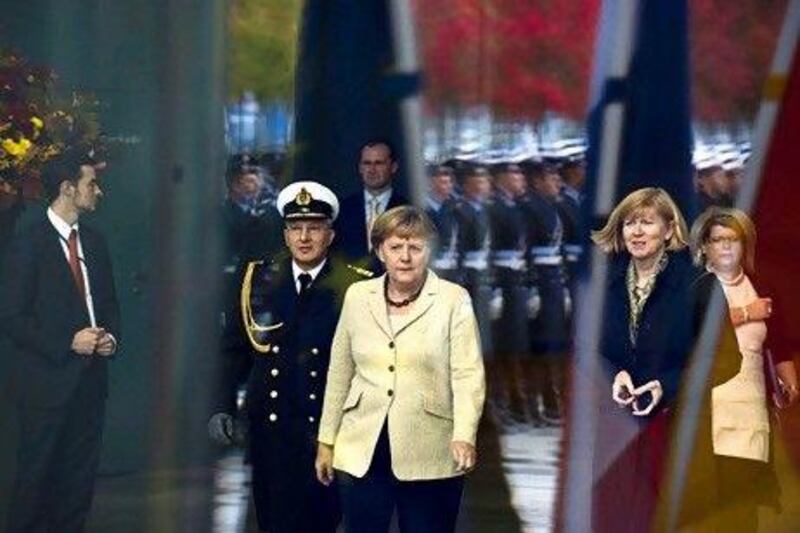Dick Olver, the chairman of the British defence manufacturer BAE Systems, personally blames German chancellor Angela Merkel for the collapse of the €36 billion (Dh171.31bn) merger with Airbus maker EADS.
In his first interview since the deal fell through last week, Mr Olver told The National that the British and French governments were in favour of the deal, but that the German leader was unexpectedly opposed.
"Merkel surprised Tom Enders [the EADS chief executive]. He didn't expect her to be so negative towards the deal. It was she who made the deal not go ahead," he said.
The enlarged company would have had the French and German governments as significant shareholders, which worried some people in the United Kingdom and United States.
Observers have pointed to German opposition as the reason the merger foundered, and last weekend the British chancellor George Osborne blamed Berlin.
But Mr Olver's claim is the first formal comment from a BAE executive on why the deal failed and the first to name Mrs Merkel as responsible for its failure.
Mr Olver, who was in Abu Dhabi for meetings with business partners in the UAE, strongly defended the commercial logic of the deal, which would have made BAE a 40 per cent holder in a new defence giant, with EADS holding the rest.
"It would have created the most competent, competitive and technologically capable defence company in the world. It was the merger of two very good companies," he said.
"Normally with huge mergers and why they fail, the issue is about people. In this case, it was interesting there were no issues in the bucket marked 'commercial logic'.That issue was closed. BAE shareholders would have got a premium even before the synergies of procurement, supply chain management and revenues, and we could have levered the civil and military sides off each other."
"But there were four governments - Britain, France, Germany and United States - that had to either approve the deal or adjust their positions to take account of it."
BAE was given responsibility for handling negotiations with the British and American authorities, while EADS was left to handle negotiations with France and Germany, he said.
"The French wanted it, but the Germans didn't. The British government was hugely helpful. We talked to the Americans right up front of the whole process, and the defence department was intrigued. But we never got to the point of explaining it fully to them. They would have been concerned about the presence of German and French governments as double-digit holders of stock.
"We had been talking for several months and it was no surprise the story leaked.So under UK takeover rules we had to put out an announcement, but we were limited in what we could say. We never got to explain in detail what was going to happen and why the deal would have been to the advantage of both companies."
Some BAE shareholders have been critical of the company's management, and of Mr Olver in particular, since the deal collapsed.But he said he felt no pressure from investors.
"I am chairman of the board, and I am confident of full board support," he said.
Some investors, led by the 13 per cent shareholder Invesco Perpetual, have indicated they would like to see a share buy-back programme instead of a merger strategy.
Mr Olver defended his company's relations with shareholders.
"We are cash generative, with a generous capital allocation policy and the buy-back strategy is part of that. We have given back £500 million [Dh2.94bn] in each of the past two years," he said, adding that the share price was strong and the company wellcapitalised.





